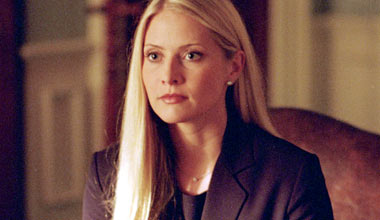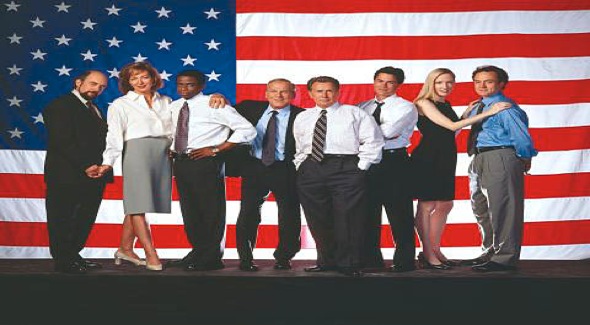IN THIS WHITE HOUSE
Sam’s humiliation on TV at the hands of a conservative writer gets compounded when Leo offers her a job. CJ panics over a slip of the tongue to a junior reporter. Toby and Josh coordinate a summit between the President of an African country and a panel of pharmaceutical CEOs on lowering the price of HIV drugs.
You wouldn’t think a show this dense with plot, character and verisimilitude would need to pad out a script with fluff. But consider this exchange between Leo and Ainsley Hayes when he offers her a job:
AINSLEY
Yes, sir. I’ll ask again: for what purpose was I brought here today?LEO
So I could offer you a job.AINSLEY
I’m asking because I do not think that it is fair that I be expected to play the role of the mouse to the White House’s cat in the game of, well, you know the game.LEO
Cat and mouse?AINSLEY
Yes. And it’s not like I’m not, you know… the fact that I may not look like some of the other Republicans who have crossed your path does not mean I am any less inclined towards…LEO
Here it comes.AINSLEY
Did you say offer me a job?LEO
Yes. Associate White House counsel. You’d report to the Deputy White House Counsel, who reports to the White House Counsel, who reports to me.AINSLEY
I’m sorry… A job in this White House?
I know that’s Sorkin’s attempt at being clever, but it just drags. It adds nothing to the narrative. We know, before the scene even begins, that Leo’s going to offer Ainsley a job. We can guess, based purely on what we know of her character, that her feelings will be conflicted. There’s no reason that this scene had to take three minutes. There’s no reason it couldn’t take 30 seconds.
This is one of my least favorite Sorkin tricks. It’s his homage to screwball, the machine gun patter of Cary Grant comedies of the 30s and 40s, but it rarely works. I never thought I’d find myself missing the laugh tracks of Sports Night, but at least they gave a script room to breathe.

It’s not purely a stylistic flourish, of course. It’s important that everyone in a Sorkin script be smart. We see lots of characters who act as villains, or as obstacles, or as comic foils, but they’re very rarely stupid. Ainsley may be confrontational, and she may be defending people that Sam considers reprehensible (gun owners), but she doesn’t mouth hollow rhetoric. She has smart, or at least clever, rejoinders to every point he makes, rejoinders that she deploys with lightning speed in her Round 2 with Sam outside Leo’s office.
You think because I don’t want to work here it’s because I can get a better gig on Geraldo? Gosh, let’s see if there could possibly be any other reason why I wouldn’t want to work in this White House? This White House that feels that government is better for children than parents are. That looks at forty years of degrading and humiliating free lunches handed out in a spectacularly failed effort to level the playing field and says, ‘Let’s try forty more.’ This White House that says of anyone that points that out to them, that they are cold and mean and racist, and then accuses Republicans of using the politics of fear. This White House that loves the Bill of Rights, all of them – except the second one.
This works even with the pharmaceutical company CEOs, who make it out of “In This White House” without being painted as venomous lizards. Yes, they’re stiff white assholes who are out of touch with the people their HIV medication serves – sub-Saharan Africans, who have a rate of HIV infection that makes the Black Plague look choosy. But there are legitimate reasons why flooding the nation of Kundu with HIV drugs won’t work. The CEOs may be callous but they’re not villainous.
No character in The West Wing, whether on the side of the angels or not, ever lacks for a comeback. This makes for stimulating dialogue and gives everyone depth, or at least the appearance of depth. But it can also make the conflicts fake and stagey. When all you have is Final Draft, everything looks like a monologue. No one expresses their feelings through a hurt look, or quiet reflection, or a wordless gesture, when there’s an opportunity to rant.
“The Midterms” was a sharp, strong episode, because everything flowed into one theme: the merit of holding fast, even when it seems like your efforts are futile. Sam’s faith is tried when he has to disappoint his friends; Toby’s faith is tried when the FBI can’t hunt down extremists. But everyone cleaves together because they believe that the system has merit.
In contrast, “In This White House” doesn’t have as strong of a theme. Ainsley tries to provide one with her clunky capstone monologue – that, despite disagreements, the staff of the Bartlet Administration are “righteous.” But where does CJ’s adolescent evasion of a feared felony charge fit into that theme? Or the existentialist muddle that comes from trying to aid African politics? The moral of this story is …?

Man, season 2 of Cowboy Bebop sure seems different. I guess I’ll have to watch the show sometime to understand how it made the transition.
This comment isn’t Sorkin enough. Needs more Sorkin.
In reference to the heavy-handed foreshadowing of “count on getting screwed,” The West Wing as a series includes many similar instances of what seems like heavy handed foreshadowing that goes nowhere. Characters express intentions and don’t follow through on them. Ideas that seem important are dropped.
I don’t want to spoil Season 2 and what comes after, so I’ll use an example from the first season. They had a media consultant named Mandy who was something of a B-string character. Around, but not core cast. She and Josh had some history, and in one episode he sent her to Toby to ask about importing a panda from China for an American zoo. Toby explains that Josh did this to embarrass her (somehow), and Mandy asks Toby to help her humiliate Josh. He appears to consider.
And then that’s over. Not only does the panda/Josh/pride/whatever thing never come up again, Mandy never comes up again. She’s just gone. Her character wasn’t really working, so it made sense to drop her. But they did it mid storyline without explanation, and they do it often enough that it became known as sending characters to “Mandyville.”
Certainly, there’s an argument to be made here that this is weak, or at least scattered, writing. But I like it. The White House is the kind of place where people come and go regularly, so a staff member moving on in between episodes doesn’t warrant much discussion. People may *want* to do something, but they may also realize they don’t have the influence/votes/support to actually do it. On The West Wing, individuals and their very clearly expressed intentions are often frustrated. But Sorkin foreshadows their success, not their surrenders.
I also liked this aspect of the show (foreshadowing a plot line that never developed on screen) because it gave the feeling that there was a lot more going on in the White House than just what we saw. As (I assume) with the real White House, there may be hundreds of things going on in a given week — from mundane office pranks to crisis-level emergencies — and no one person (or viewer) could be expected to know the intimate details of all of them.
So The West Wing shows us events from across the spectrum, but it doesn’t even pretend to follow all of them because it can’t, because there’s too much going on. That idea, that the characters always have much more to get done than we see them do, justifies and explains the show’s fast pace (would they have a need to walk-and-talk if they only did what we saw on screen?), the ensemble cast, and dramatic slow downs (if the characters think that a topic is worth sitting down for, then it must be important).
You could argue this is over-the-top and that the viewer could be trusted to assume that work gets done off-camera, but the West Wing didn’t require the viewer to assume that, it showed it happening with the dropped threads. It was just another element that supported the show’s verisimilitude. (And, from a dramatic perspective, it helped alleviate expectations created by a Chekhov’s Gun. If you didn’t know what was going to be dropped, it was tough to guess which issue would rise to become the next crisis–putting the viewer in similar shoes to the characters, who also don’t often know what’s coming next.)
It’s not that Tom lost the election that upsets him and his wife, it’s that he lost the election because the White House has tacitly condemned him as a racist. That’s the kind of stain that doesn’t wash out, especially for a Democrat.
For that matter, I’m not surprised the Bartlett White House was cautious about endorsing him, even though his past is only mildly controversial: they don’t have any black senior staff, their party is vulnerable in Congress, and there’s several points during the course of the show (I think at least once in S1) where they find themselves at odds with the black caucus. They can’t afford a whiff of racial insensitivity.
I didn’t see her warning as foreshadowing, just as an epitaph to this friendship Sam had: it’s over. They hate him now.
That’s the kind of stain that doesn’t wash out, especially for a Democrat.
Do you mean “a Democrat,” as in a member of the fictional Democratic party that exists in this television show? Or do you mean as in actual Democrats in actual Congress? Because overt racism has never been a bar, depending on what district you come from.
they don’t have any black senior staff, their party is vulnerable in Congress, and there’s several points during the course of the show (I think at least once in S1) where they find themselves at odds with the black caucus.
This is interesting to know. Thanks!
In that group photo, what’s that white stuff, paint maybe, spattered all over Danny Tripp’s legs? That’s weird.
That would be a rim light. It’s also visible on the backs of Dana Chase’s calves, only less so, because it’s at a different angle.
Also of possible interest, a recent post on the liberal site ThinkProgress argues that Bartlet wasn’t a very good president. It drew a sharp response from Bartlet himself (or, at least his Facebook alter ego).
**Warning: Spoilers for Seasons 1 through 5**
http://thinkprogress.org/alyssa/2012/02/14/423446/josiah-bartlet-was-a-mediocre-president